
Marco Bello
Investment Thesis
Fearless investors love chasing huge returns, and there is no better example than Cathie Wood, CEO at ARK Invest. The outstanding performance of her flagship fund, the ARK Innovation ETF (NYSEARCA:ARKK), earned her the title of Bloomberg’s Stock Picker of the Year in 2020. Unfortunately, ARKK’s price has collapsed spectacularly, underperforming the SPDR S&P 500 ETF (SPY) by 40% YTD, and now trades near March 2020 levels. While Wood continues to collect hefty management fees, I sincerely doubt shareholders enjoy paying them.
And so the plot thins.
I write this because it’s not difficult to see what’s happening. Most ARKK holdings share four features: high growth potential, high valuations, high volatility, and poor profitability. These speculative stocks have the odd outstanding year that 40 years of data confirms. However, until now, they weren’t expertly wrapped up under the guise of thematic investing. I think ARKK eventually hit it big again, but that doesn’t make it a good product. For me, the Invesco QQQ ETF (QQQ) is far superior, and I look forward to demonstrating why in this article.
ARKK Snapshot
To begin, I want to highlight the volatility, growth, and price returns for ARKK’s top 25 holdings, which total 94.49%. I’ve also included each company’s Seeking Alpha Factor Grades and normalized them on a scale from 1-10.
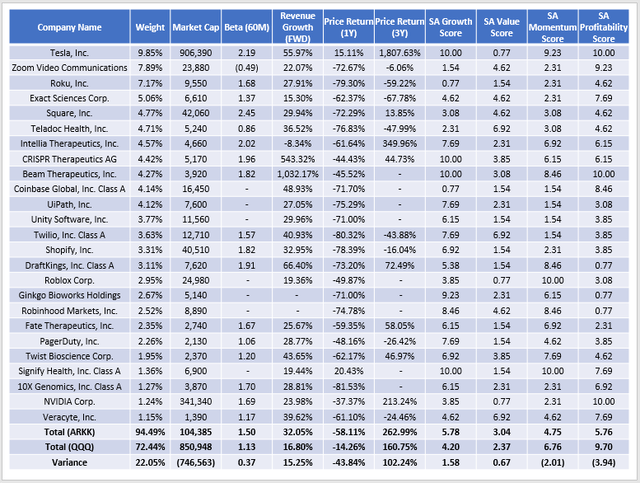
The Sunday Investor
First, ARKK’s holdings are typically much smaller. The weighted-average market capitalization is still $104 billion, but that’s primarily due to Tesla (TSLA) and NVIDIA (NVDA). The median market capitalization is just $5.2 billion, so these are small-cap stocks for the most part.
ARKK’s five-year beta is 1.50, meaning it’s 50% more volatile than the broader market. However, several companies weren’t trading five years ago, so this figure may be higher. ARKK and QQQ’s two-year betas are 1.89 and 1.19, so generally, ARKK investors should prepare for nearly double the volatility.
Estimate sales growth over the next year is approximately double that of QQQ at 32.05%. To control for outliers like CRISPR Therapeutics (CRSP) and Beam Therapeutics (BEAM), I’ve applied a 50% cap per security to arrive at the 32.05% figure. However, I don’t think it matters much. ARKK holds fast-growing stocks in spades, and it’s a question of valuation. The price returns over the last one and three years help illustrate how difficult that question is to answer. Constituents are down a weighted-average 58.11% over the previous year but are up 262.99% over the last three years. A closer look reveals Tesla drove most of these returns since the median three-year return for the remaining constituents is a loss of 21.25%.
Finally, Seeking Alpha’s Factor Grades reveal ARKK is slightly better than QQQ on value and growth but comes up short on momentum and has a disastrous 5.76 / 10 Profitability Score. Among the over 800 U.S. Equity ETFs I track, this score places ARKK in the bottom 10%. Other ARK ETFs (ARKF, ARKW, IZRL, ARKQ, ARKX, ARKG) have Profitability Scores ranging from 4.64 to 6.21, which pale in comparison to QQQ’s 9.70.
Valuation: Where To Begin?
You may have noticed that the earlier table didn’t include any valuation metrics. The reason is that most holdings have negative earnings and, in many cases, negative operating cash flow. Instead, consider these statistics for ARKK’s 34 holdings:
- 19 have negative operational cash flow (44.37% total weight)
- 28 reported negative earnings per share last quarter (74.30% total weight)
- 27 have negative 1Y return on total capital margins (72.41% total weight)
- 11 missed analyst earnings per share estimates (29.40% total weight)
- 12 missed analyst sales per share estimates (37.08% total weight)
These statistics mean the valuation metrics provided on sites like Morningstar aren’t helpful. Excluded are stocks with negative earnings and cash flows, suggesting a cheaply-valued ETF. This isn’t an issue with QQQ, as only two holdings (0.46% total weight) have negative operating cash flow, and ten have a negative return on total capital margin (2.34% total weight).
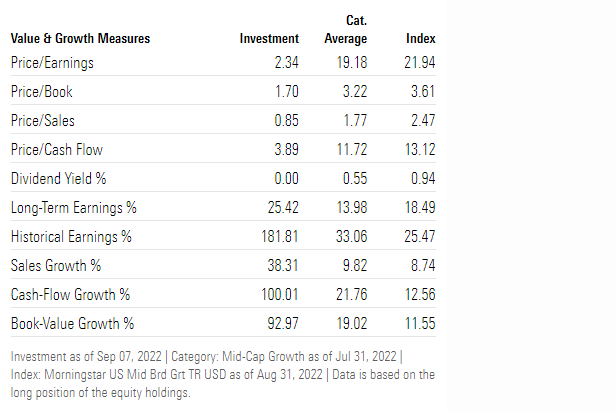
Morningstar
ARKK Performance
ARKK has had two incredibly successful years since its October 2014 launch. In 2017, it gained 87.34% compared to 32.66% and 21.70% for QQQ and SPY, and in 2020, it outperformed these benchmarks by 104.42% and 134.45%. However, ARKK lagged QQQ by 50.80% and 30.63% in 2021 and 2022 YTD.
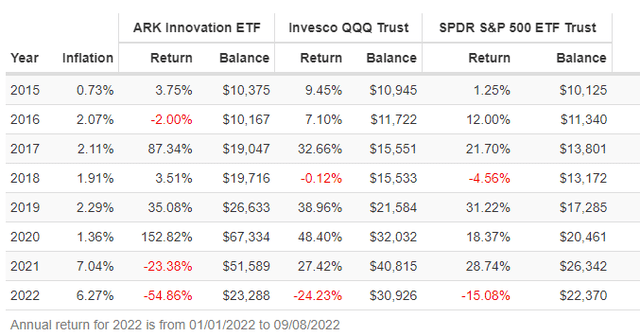
Portfolio Visualizer
For long-term shareholders, annualized returns were still strong since inception (11.12%) but well behind QQQ’s 15.65% per year gains with much higher volatility.
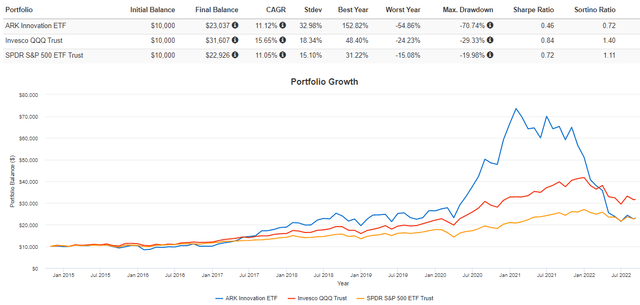
Portfolio Visualizer
This chart suggests that with ARKK, you have to know when to sell. While the ETF itself doesn’t have much history to go by, the prudent move looks to be selling after a year of extraordinary gains.
Non-Profitable vs. Profitable Stocks
Based on the earlier metrics showing ARKK holding primarily non-profitable stocks, readers may find how these stocks performed historically helpful. Absent sufficient history for ARKK, we can turn to portfolio results formed by operating profitability from the Kenneth French Data Library. Here is how equal-weighted portfolios of non-profitable and profitable stocks performed alongside ARKK and QQQ from January 2015 to July 2022.
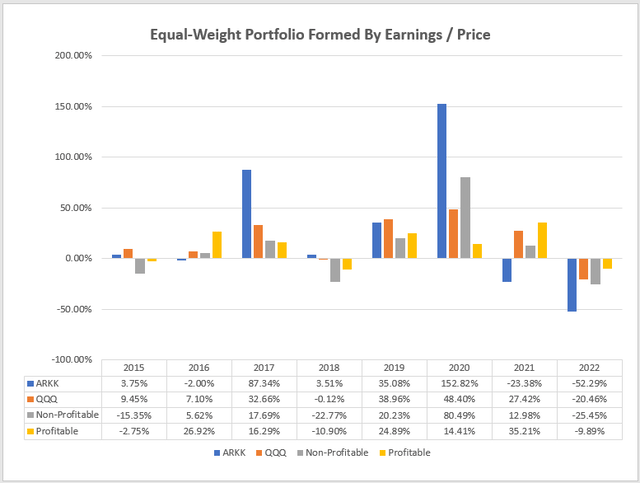
Chart Source: The Sunday Investor; Data Source: Kenneth French Data Library, Portfolio Visualizer
In my view, ARKK has become a more extreme version of the non-profitable portfolio in recent years. The following chart illustrates this by comparing ARKK and QQQ’s annual return differences with the non-profitable and profitable portfolio return differences.
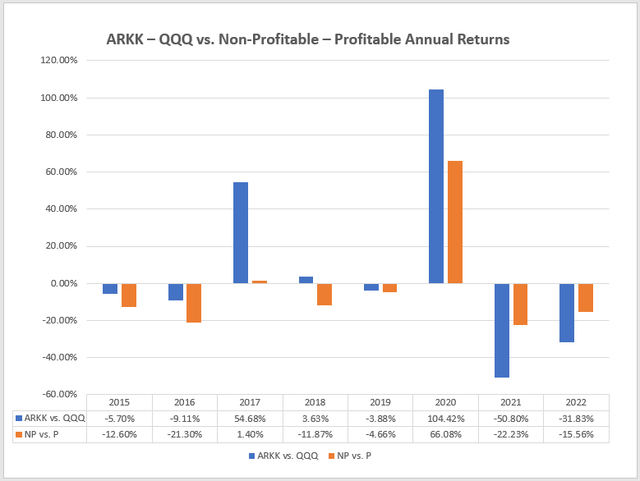
Chart Source: The Sunday Investor; Data Source: Kenneth French Data Library, Portfolio Visualizer
Except for 2018, ARKK outperformed whenever non-profitable stocks outperformed, and vice versa. 2017 was an anomaly, but that was a year when the price of Bitcoin jumped by 1,338%. The ETF’s annual report noted how the portfolio benefited tremendously from its position in GBTC.
The top contributor to the Fund’s performance was The Bitcoin Investment Trust (OTC:GBTC), an investment trust backed by bitcoin. The cryptocurrency market moved into an exponential growth phase starting in April 2017, as bitcoins acceptance improved across the globe with Japan’s approval of bitcoin as a legal form of payment.
Here is a history of the two equal-weighted portfolios dating back to 1985. The non-profitable portfolio (blue bars) consistently underperforms after a year of extraordinary gains, and ARKK’s performance in 2021-2022 follows this pattern well.
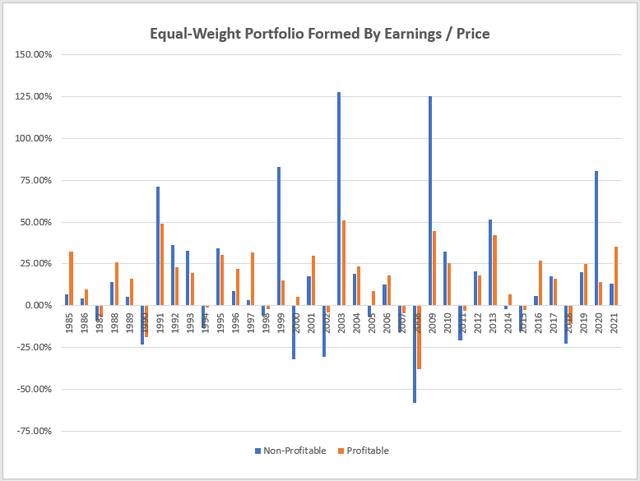
Chart Source: The Sunday Investor; Data Source: Kenneth French Data Library
Here are some interesting statistics you may find interesting:
- The non-profitable portfolio did better on average (15.89% vs. 15.52%)
- However, two-year rolling average returns lagged (12.12% vs. 13.78%)
- Three-year rolling average returns lagged more (10.21% vs. 13.45%)
- Five-year rolling average returns lagged even more (9.59% vs. 13.41%)
These statistics support the importance of cashing out quickly after a year of significant gains. The odds of you coming out ahead of the much safer profitable portfolio, which QQQ is an excellent proxy for, are low.
Can Technical Analysis Help?
I don’t think so, primarily because ARKK has a high portfolio turnover. From 2016-2021, turnover rates were 110%, 70%, 89%, 80%, 80%, and 71%, according to the last annual report. These figures indicate that each year, ARKK’s holdings are very different. To use the previous example, why would an analyst consider ARKK’s price chart from 2017 when Bitcoin was the primary reason the ETF outperformed? GBTC isn’t held by ARKK anymore, nor are 80% of the holdings from that year.
ARKK derives its value from its underlying holdings. It benefits when stocks like Tesla gain, and the ETF doesn’t trade at any significant premium or discount to NAV because of its structure. Analysts can still perform technical analysis on the current portfolio, assuming it remains relatively stable and appropriate rebalancing is applied. However, I’ve yet to see that done with ARKK.
Technical analysis has merits, but analysts should apply it on individual stocks or passive Index ETFs with low portfolio turnover. SPY and QQQ are two good examples, with 2% and 9% turnover rates, respectively. With these ETFs, we have reasonable assurance that the holdings today are similar to what they were over the measurement periods. Therefore, analysts can make more accurate predictions about future price movements.
Investment Recommendation
ARKK’s returns align with how non-profitable portfolios have performed for almost 40 years, possibly longer. The difference today is that Cathie Wood has expertly packaged these non-profitable, highly volatile stocks into an easy-to-trade product. Bitcoin drove its gains in 2017, pandemic stocks defined 2020, and had ARKK launched in 2009, when non-profitable stocks outperformed by 81%, Wood’s flagship fund likely would have at least doubled in value.
It’s only a matter of time before ARKK hits it big again. It could be this year or five years from now, and it won’t make much sense to fundamental investors. However, a better strategy is to stick with highly profitable stocks in a low-cost ETF like QQQ. Historical data indicates that such an approach is preferable even for those with time horizons as short as two years.
Remember that extraordinary gains for non-profitable stocks are regular occurrences every 5-7 years. ARKK’s rise and fall was bound to happen, and if you happen to hit it big, I suggest cashing out quickly. That’s not my style, and since I don’t yet see a catalyst for a huge risk-on environment, I’m rating ARKK as a sell today. Thanks for reading, and I look forward to discussing further in the comments section below.


Be the first to comment